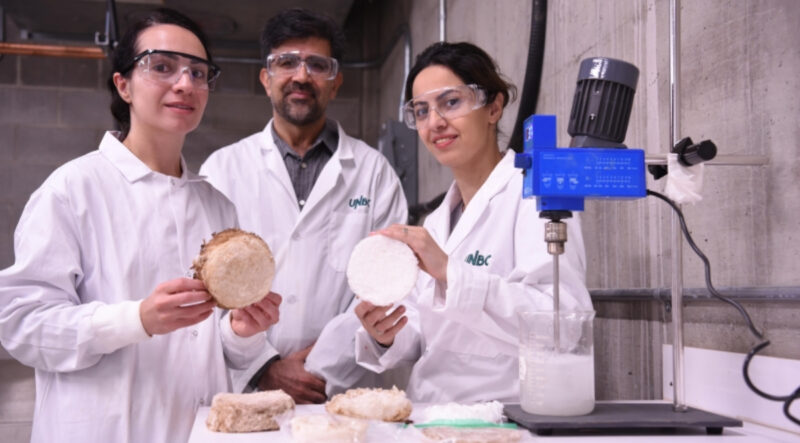Award winning project aims to replace plastic seafood packaging
“This is one of the most promising candidates for an alternative material to replace traditional plastics ” – Innovate BC
By Fabian Dawson
SeaWestNews
One of Vancouver Island’s leading farmed salmon processors has teamed up with researchers at the University of Northern British Columbia (UNBC) to deliver new ways to package and ship seafood.
The project by the Campbell River-based Browns Bay Packing Company Ltd. and Dr. Hossein Kazemian involves the formulation of a renewable and fully biodegradable hybrid packaging solution.
“This is one of the most promising candidates for an alternative material to replace traditional plastics,” said Innovate BC, when granting the project $300,000 at a recent awards ceremony in Vancouver.
Seven other research and development projects that are creating game-changing innovations were given a total $2,325,000 through Innovate BC’s Ignite program, which aims to accelerate the commercialization of biotech, cleantech, mining, agriculture, and forestry projects.
“Innovation is key in our business to ensure the continued sustainability of aquaculture on Vancouver Island,” said Dave Stover a co-owner and the CEO of Brown’s Bay Packing Company, which has been processing farm raised salmon since 1989.
“We live, work and play in the area where our business is located. We raise our families here and care deeply about the marine environment and that’s why this project is so important for us,” he told SeaWestNews.
“Fish isn’t just how we make a living—it’s part of our DNA. We have a love for the oceans and community that spans generations and this project is just one of the ways we show it,” said Stover.
The scale of the current packaging challenge is immense, said UNBC.
Every year, seafood suppliers use hundreds of millions of plastic containers to ship their products safely. As jurisdictions around the world are imposing bans on single-use plastics, it is imperative to develop new products that can replicate the performance of petroleum-based plastic, but come from a sustainable source.
The solution Kazemian’s team has come up with is first to create hybrid packing using cardboard for structure and isothermal starch foam inserts for insulation as well as water resistance.
The starch is biodegradable and can be produced on a large scale at a low cost. It’s also chemically inert and meets all food safety requirements.
“Globally, there are close to hundreds of millions of boxes annually used for farm fishing, and close to the same number for wild seafoods,” said Dr. Kazemian, head of Northern Analytical Laboratory Services at UNBC.
“The thing that they are using right now for packaging, is Styrofoam expanded polystyrene, which is not ecofriendly, it’s not biodegradable.”
“The innovation is to develop an alternative to expanded polystyrene (EPS Styrofoam) by providing a plant-based bioplastic foam that is cost-competitive to oil-based Styrofoam for the purpose of fresh fish transport,” Kazemian said.
“Our innovation will continually improve the polymer combinations providing cost efficiency with novel formulations and advancements in properties, for example, water resistance with consideration for biomass availability in large-scale manufacturing,” said Dr. Nasim Ghavidel, the Elevate Postdoc who leads this research and development project at the MATTER lab.
“Starch foam is already there, so we can really build companies that are making them, but one of the problems is that they are not water-resistant, so they can provide the thermal insulation that we need, but they cannot provide the physical stability and water resistance we need.”
According to Kazemian, the company wanted to do the replacement as soon as possible, so they decided on the hybrid combination.
“That’s the main innovation in the first stage of this project, which is our short-term, our mid-term solution,” he explained.
“We are very close, hopefully next year, or less than a year, we think the first product is going to be out of our pilot plant.”
Kazemian said using a starch-based foam is only being used temporarily, because the starch is a food source, which could otherwise be used for food.
The team is still looking at other options, including wood-based materials.
“Given the fact we are in the fibre-basket of Canada in Northern BC, and we have lots of wood and forest, this can be one of the cheapest or least expensive source of raw materials,” Kazemian explained to my MyPGNow.com
“This is not a food source, and can get renewed anyway, so we can use that to develop the new bio-polymer based on wood-cellulose.”
Kazemian added the polymer they are developing can be used for other purposes, such as insulation.
“It’s so thrilling to see these incredible innovations in natural resources and applied sciences being developed right here in British Columbia,” said Raghwa Gopal, President + CEO of Innovate BC.
“In the past 8 years Innovate BC has invested over $10M in market driven research that is creating jobs, transforming industries, and pushing the boundaries of innovation.”
UNBC Image shows Dr. Nasim Ghavidel (from left), Dr. Hossein Kazemien and Helena Mirzabeigi who are studying ways to make seafood packaging more sustainable.

